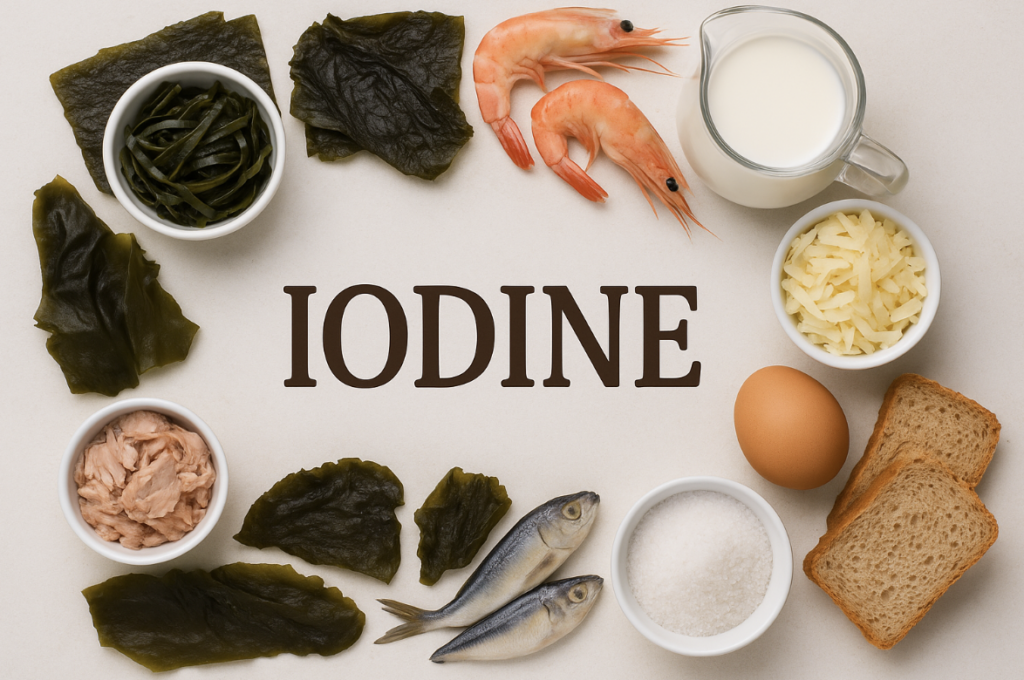Iodine is a trace mineral essential for proper thyroid function, metabolism, and brain development. Even though your body only needs small amounts, iodine deficiency can lead to serious health problems—including goiter, fatigue, infertility, and cognitive delays. In this guide, we’ll cover how iodine supports the body, common signs of deficiency, the best dietary sources, and how to avoid both too little and too much.
What Does Iodine Do in the Body?
Iodine is crucial for the production of thyroid hormones, which regulate metabolism, growth, and many other bodily functions.
✔ Key Functions of Iodine:
- Produces thyroid hormones T3 and T4
- Regulates metabolism and energy production
- Supports brain and nervous system development (especially during pregnancy)
- Promotes healthy skin, hair, and nails
- Aids in reproductive health and hormonal balance
💡 Did You Know? The thyroid gland stores about 70–80% of the iodine in your body.
Top Health Benefits of Iodine

✔ 1. Maintains Healthy Thyroid Function
Without iodine, your thyroid can’t make enough hormones—leading to hypothyroidism, fatigue, and weight gain.
✔ 2. Supports Metabolism and Weight Management
Thyroid hormones influence how your body uses energy, affecting everything from temperature regulation to fat burning.
✔ 3. Essential for Fetal and Child Development
Adequate iodine during pregnancy supports brain development and prevents developmental delays.
✔ 4. May Improve Mental Clarity and Mood
Balanced iodine intake supports stable energy and concentration by keeping thyroid hormones in check.
✔ 5. Protects Against Goiter and Hormonal Imbalances
Iodine helps prevent goiter (thyroid enlargement) and may reduce PMS and fertility issues related to low thyroid hormones.
Signs of Iodine Deficiency

⚠️ Common Symptoms:
- Fatigue or sluggishness
- Weight gain or cold intolerance
- Puffy face or dry skin
- Hair thinning or brittle nails
- Difficulty concentrating (brain fog)
- Enlarged thyroid gland (goiter)
💡 At-Risk Groups:
- Pregnant or breastfeeding women
- People who avoid iodized salt
- Vegans or those on dairy- and seafood-free diets
- People living in regions with iodine-poor soil
Best Food Sources of Iodine

🌊 Marine-Based Sources:
- Seaweed (kelp, nori, wakame) — the richest natural source
- Cod, tuna, shrimp, and other seafood
🥛 Animal-Based Sources:
- Milk, yogurt, and cheese (depending on iodine content in cow feed)
- Eggs (especially the yolk)
🧂 Fortified Sources:
- Iodized table salt (1/4 teaspoon provides ~70 mcg)
- Fortified bread and infant formula in some countries
💡 Tip: The iodine content of food varies depending on soil quality, animal feed, and food processing methods.
Recommended Daily Intake (RDI)
- Adults: 150 mcg/day
- Pregnant women: 220 mcg/day
- Breastfeeding women: 290 mcg/day
- Children and infants: 90–130 mcg/day depending on age
Iodine Supplement Considerations
💊 Forms Available:
- Potassium iodide or sodium iodide (common in multivitamins)
- Kelp-based or seaweed-derived supplements
⚠️ Too Much Iodine?
- High intake (>1,100 mcg/day) may lead to thyroid dysfunction, hyperthyroidism, or autoimmune flare-ups.
💡 Tip: Stick to supplements under 150 mcg/day unless instructed otherwise by your doctor.
Pros and Cons of Iodine
✔ Pros:
- Essential for thyroid, metabolism, and development
- Prevents goiter and cognitive impairments
- Easily available through iodized salt or seaweed
⚠️ Cons:
- Both deficiency and excess can harm the thyroid
- Some foods (cruciferous veggies, soy) may impair iodine uptake if consumed in excess without adequate iodine
Iodine is a small but mighty mineral essential for thyroid health, energy, brain development, and hormonal balance. While iodized salt helps prevent deficiency in many regions, whole food sources like seaweed, fish, and dairy provide a more nutrient-rich solution. If you’re concerned about your thyroid or diet, consult a healthcare provider before using iodine supplements.
Read more on vitamin K and how it protects your bones and heart
Learn more about iodine from the National Institutes of Health
